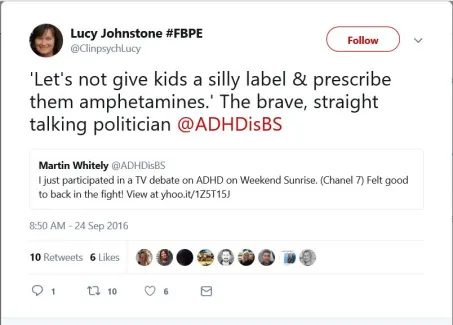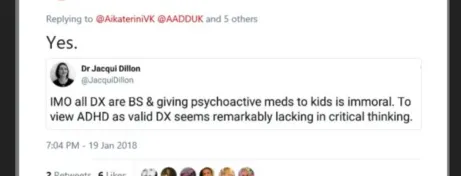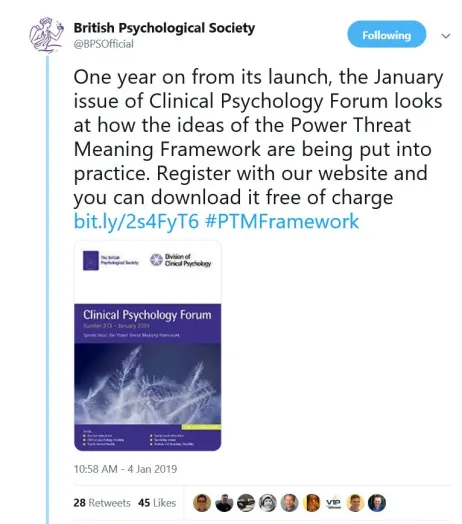YET ANOTHER UPDATE TO OUR, SO FAR, FRUITLESS COMPLAINTS TO THE BPS:
Thursday, 12 December 2019:
We sent the following email to BPS:
Did the Trustees ever finish investigating my complaint about the way ADHD is stigmatised in the Power Threat Meaning Framework.
To date, the PTMFramework is still available on the BPS website and still contains demeaning statements about people with ADHD.
I realise 11 months have passed so for speed of reference, I’ve reattached my original documents as well as additional documents showing that BPS has actively promoted the framework.
Tuesday, 9 July 2019:
As of today, we’ve heard nothing from anyone at The British Psychological Society (BPS) regarding their investigation of our complaint about the stigmatisation of people with ADHD in The Power Threat Meaning Framework (PTMF). You can read the history of this sorry matter under ‘Past Events’ at the end of this post as well as in the ‘Featured Posts’ below this one.
We are now preparing to escalate our complaint.
To be frank, we feel surprised, and yes a bit hurt, that we haven’t heard from BPS because it really wouldn’t have taken much effort on their part to discover that the authors of the PTMF are in fact ADHD deniers.
See for example this 2016 tweet from the lead author:

and this 2018 tweet from another PTMF author:

There are plenty more examples from others, but you get the picture.
The authors, of course, as private individuals have the right to their opinions and have the right to publish them under their own names. But the PTMF, as it states on the copyright page, was printed and published by The British Psychological Society, BPS owns the copyright and their logo tops the cover page.
In the document summary on page 5, the authors have explained how the PTMF came about thus:
In 2013, the Division of Clinical Psychology (DCP) of the British Psychological Society (BPS) published a Position Statement entitled Classification of behaviour and experience in relation to functional psychiatric diagnoses: Time for a paradigm shift. Recommendation 3 of the position paper is: ‘To support work, in conjunction with service users, on developing a multi-factorial and contextual approach, which incorporates social, psychological and biological factors’ (p.9). This document is the result of a DCP-funded project for work towards fulfilling this aim.
And here is the British Psychological Society promoting the one year anniversary of the launch of the PTMF:

Seems pretty clear that the PTMF has been published under the aegis of The British Psychological Society thus endorsing and legitimising the authors’ lack of knowledge about neurodevelopmental disorders as well as their disrespectful & discriminatory attitude towards people with ADHD.
It shouldn’t be necessary for us to draw the attention of the BPS and the authors to the ethical principles in BPS’ Code of Ethics but since it is, here are two quotes from page 5 they may want to start with:
Respect for the dignity of persons and peoples is one of the most fundamental and universal ethical principles across geographical and cultural boundaries, and across professional disciplines.
Statement of values: Psychologists value the dignity and worth of all persons, with sensitivity to the dynamics of perceived authority or influence over persons and peoples and with particular regard to people’s rights.
They might also want to reflect upon this quote from page 2:
Ethical reasoning is often subject to various competing biases. Maintaining awareness of such biases is important when trying to think through ethical challenges. These considerations currently include but are not limited to, salience (how readily something comes to mind), confirmation bias (the human tendency to look for evidence that confirms their belief and to ignore other evidence), loss aversion (behaviour to avoid loss), beliefs about disclosure (tendency to be more honest when they believe their actions will be known by others), and dissonance reduction (acting to maintain consistent beliefs). This list will evolve over time with the advancement of knowledge in this area. Psychologists are therefore well placed and encouraged to consider these factors in their own decision-making.
We would also urge BPS and the authors to begin thinking about this quote from page 3:
Psychologists should consider it good practice to record their decision processes when confronted with a particularly challenging ethical issue so that it is available for future reference if that decision is re-visited.
As I wrote at the beginning, we’re preparing to escalate our complaint!
PS: Here’s a link to The British Psychological Society’s Code of Ethics and Conduct.
PAST EVENTS
On Monday, 14th January 2019, we received an email from the Governance Manager of the British Psychological Society letting us know that a Director of the Society has been appointed to investigate the issues we have raised and that the investigation will take 4 weeks to complete.
On Wednesday, 2nd January 2019, we received the following reply from the Governance Manager at BPS:
Your complaint as set out below has been forwarded to me for attention. I am very sorry to learn of your concerns
I am making enquiries into the matters which you raise and I will be in touch as soon as my enquiries are complete
Kindest regards
On Sunday, 9th December 2018, we sent the following email to the Chief Executive and Trustees of the British Psychological Society (BPS):
Dear Mr Bajwa and Trustees of the British Psychological Society,
I would like to bring to your attention the harmful manner in which Attention Deficit Hyperactivity Disorder is referenced in the document titled ‘Power Threat Meaning Framework’ (PTMFramework).
Lucy Johnstone, lead author, on 30 November 2018 told us on Twitter that all discussions of ADHD had been specifically excluded from the PTM Framework (see attached: ‘Tweets September to 30 November 2018’). But to date, the uncorrected version of the PTM Framework ( i.e. the version containing 16 references to ADHD, all of which are stigmatising and harmful) is still on the British Psychological Society’s website here https://www.bps.org.uk/news-and-policy/introducing-power-threat-meaning-framework
If you are able, please could you provide us with a copy of the amended version of the Framework and ensure that the uncorrected copy is replaced?
If it has not been amended, please could you discuss this matter with the Trustees as to whether or not the Framework meets the requirements of the BPS Royal Charter.
Sadly, we have some doubts as to whether the Framework has been amended as Lucy Johnstone and her fellow authors are adamantly opposed to psychiatric diagnoses as illustrated in one of the attached tweets as well as in the following quote from the 3rd paragraph on page 314 of the PTM Framework:
At the same time as affirming people’s right to describe their difficulties as they wish, we affirm the equally important principle that professionals, researchers, trainers, lecturers, charities, policy-makers and others involved in the mental health field should use language and concepts that have some claim to be descriptively accurate and evidence-based. Because psychiatric diagnosis does not meet these standards, it follows that it can no longer be considered professionally, scientifically or ethically justifiable to present psychiatric diagnoses as if they were valid statements about people and their difficulties. To draw an analogy from psychiatric history, once it becomes clear that terms like ‘wandering womb’ are mistaken, no professional should be offering – let alone imposing – them.
For your information here is some background:
In January 2018, the launch of the Power Threat Meaning Framework was heavily promoted on Twitter under #PTMFramework and as part of the launch it was also advertised as being available on the British Psychological Society’s website. As a result of this we, Adult Attention Deficit Disorder-UK (AADD-UK), became aware of the published document so we downloaded the full version (414 pages) and read it.
There are 16 specific references to Attention Deficit Hyperactivity Disorder (ADHD) in the framework (see attached document) which are in themselves incorrect and when read in the context of the framework as seen in the quote above.
We’ve given our feedback to the authors many times since the launch of the PTM Framework, but until 30th November 2018 it has been consistently ignored. Please note that while Lucy Johnstone says she won’t engage in a debate about the framework, she is still actively promoting it on Twitter.
We are bringing this to your attention as well as the attention of the trustees not only because Lucy Johnstone directed us to the BPS but also because the presence of the BPS Logo on the Framework lends credence and validity to statements which stigmatise people with ADHD.
If you have any questions, please do not hesitate to contact me. I’m very willing to help.
Here is a link to the copy of some tweets we sent to the BPS, Tweets September to 30 November 2018
Here is a link to a list of the statements in the Power Threat Meaning Framework that we sent to the BPS, Quotes from PTMF for Letter
And finally, if anyone is interested in reading more, here is a link to the 414 page version of the Power Threat Meaning Framework: Towards the identification of patterns in emotional distress, unusual experiences and troubled or troubling behaviour, as an alternative to functional psychiatric diagnosis
Discussion
Comments are closed.